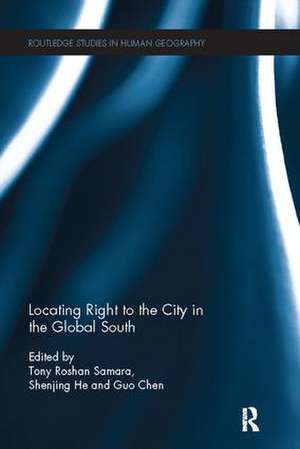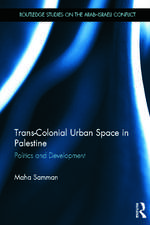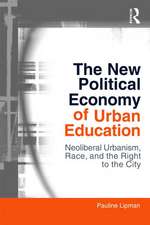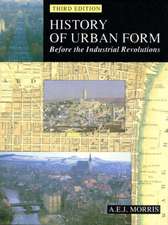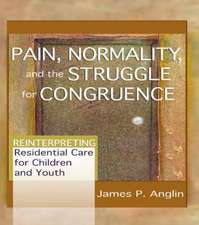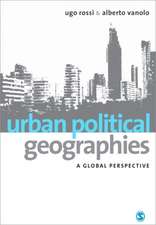Locating Right to the City in the Global South: Routledge Studies in Human Geography
Editat de Tony Samara, Shenjing He, Guo Chenen Limba Engleză Paperback – 31 mai 2017
Locating Right to the City in the Global South marks an innovative and far reaching effort to document and make sense of urban transformations across a range of cities, as well as the conflicts and struggles for social justice these are generating. The volume contains empirically rich, theoretically informed case studies focused on the social, spatial, and political dimensions of urban inequality in the Global South. Drawing from scholars with extensive fieldwork experience, this volume covers sixteen cities in fourteen countries across a belt stretching from Latin America, to Africa and the Middle East, and into Asia. Central to what binds these cities are deeply rooted, complex, and dynamic processes of social and spatial division that are being actively reproduced. These cities are not so much fracturing as they are being divided by governance practices informed by local histories and political contestation, and refracted through or infused by market based approaches to urban development. Through a close examination of these practices and resistance to them, this volume provides perspectives on neoliberalism and right to the city that advance our understanding of urbanism in the Global South.
In mapping the relationships between space, politics and populations, the volume draws attention to variations shaped by local circumstances, while simultaneously elaborating a distinctive transnational Southern urbanism. It provides indepth research on a range of practical and policy oriented issues, from housing and slum redevelopment to building democratic cities that include participation by lower income and other marginal groups. It will be of interest to students and practitioners alike studying Urban Studies, Globalization, and Development.
| Toate formatele și edițiile | Preț | Express |
|---|---|---|
| Paperback (1) | 484.53 lei 43-57 zile | |
| Taylor & Francis – 31 mai 2017 | 484.53 lei 43-57 zile | |
| Hardback (1) | 825.62 lei 43-57 zile | |
| Taylor & Francis – 10 dec 2012 | 825.62 lei 43-57 zile |
Din seria Routledge Studies in Human Geography
-
 Preț: 332.18 lei
Preț: 332.18 lei -
 Preț: 371.71 lei
Preț: 371.71 lei -
 Preț: 334.09 lei
Preț: 334.09 lei -
 Preț: 341.08 lei
Preț: 341.08 lei - 18%
 Preț: 1057.75 lei
Preț: 1057.75 lei - 18%
 Preț: 1072.71 lei
Preț: 1072.71 lei - 12%
 Preț: 299.87 lei
Preț: 299.87 lei -
 Preț: 490.62 lei
Preț: 490.62 lei - 25%
 Preț: 823.63 lei
Preț: 823.63 lei - 18%
 Preț: 1058.79 lei
Preț: 1058.79 lei - 18%
 Preț: 1054.71 lei
Preț: 1054.71 lei - 13%
 Preț: 296.11 lei
Preț: 296.11 lei - 18%
 Preț: 1057.89 lei
Preț: 1057.89 lei - 25%
 Preț: 825.62 lei
Preț: 825.62 lei - 18%
 Preț: 732.06 lei
Preț: 732.06 lei -
 Preț: 414.32 lei
Preț: 414.32 lei - 18%
 Preț: 1062.98 lei
Preț: 1062.98 lei - 18%
 Preț: 702.31 lei
Preț: 702.31 lei - 18%
 Preț: 1057.09 lei
Preț: 1057.09 lei - 18%
 Preț: 1169.66 lei
Preț: 1169.66 lei - 18%
 Preț: 1114.98 lei
Preț: 1114.98 lei -
 Preț: 408.54 lei
Preț: 408.54 lei -
 Preț: 419.50 lei
Preț: 419.50 lei - 28%
 Preț: 823.08 lei
Preț: 823.08 lei -
 Preț: 373.59 lei
Preț: 373.59 lei - 5%
 Preț: 353.14 lei
Preț: 353.14 lei - 18%
 Preț: 1055.06 lei
Preț: 1055.06 lei - 18%
 Preț: 1058.69 lei
Preț: 1058.69 lei - 18%
 Preț: 1065.06 lei
Preț: 1065.06 lei - 18%
 Preț: 1060.87 lei
Preț: 1060.87 lei - 18%
 Preț: 1069.92 lei
Preț: 1069.92 lei -
 Preț: 418.65 lei
Preț: 418.65 lei -
 Preț: 446.58 lei
Preț: 446.58 lei -
 Preț: 408.74 lei
Preț: 408.74 lei -
 Preț: 423.30 lei
Preț: 423.30 lei - 18%
 Preț: 1055.51 lei
Preț: 1055.51 lei - 28%
 Preț: 878.82 lei
Preț: 878.82 lei - 18%
 Preț: 1061.57 lei
Preț: 1061.57 lei - 26%
 Preț: 849.84 lei
Preț: 849.84 lei - 18%
 Preț: 733.11 lei
Preț: 733.11 lei - 25%
 Preț: 855.05 lei
Preț: 855.05 lei - 12%
 Preț: 338.81 lei
Preț: 338.81 lei - 26%
 Preț: 764.20 lei
Preț: 764.20 lei
Preț: 484.53 lei
Nou
Puncte Express: 727
Preț estimativ în valută:
92.72€ • 97.05$ • 77.17£
92.72€ • 97.05$ • 77.17£
Carte tipărită la comandă
Livrare economică 31 martie-14 aprilie
Preluare comenzi: 021 569.72.76
Specificații
ISBN-13: 9781138108103
ISBN-10: 1138108103
Pagini: 328
Ilustrații: 78
Dimensiuni: 156 x 234 x 18 mm
Greutate: 0.5 kg
Ediția:1
Editura: Taylor & Francis
Colecția Routledge
Seria Routledge Studies in Human Geography
Locul publicării:Oxford, United Kingdom
ISBN-10: 1138108103
Pagini: 328
Ilustrații: 78
Dimensiuni: 156 x 234 x 18 mm
Greutate: 0.5 kg
Ediția:1
Editura: Taylor & Francis
Colecția Routledge
Seria Routledge Studies in Human Geography
Locul publicării:Oxford, United Kingdom
Public țintă
PostgraduateCuprins
Introduction: Locating Right to the City in the Global South Part I: A City Divided Against Itself 1. Towards the Right to the City in Informal Settlements 2. Cities Without Slums in Morocco? New Modalities of Urban government and the Bidonville as a Neoliberal Assemblage 3. The Divisive Nature of Neoliberal Urban Renewal in Ouagadougou, Burkina Faso 4. Greening Dispossession: Environmental Governance and Socio-spatial Transformation in Yixing, China Part II: Governance and Cosmopolitanism: Escaping the South 5. Urban Governance, Mega-Projects, and Scalar Transformations in China and India 6. Bourgeois Environmentalism, Leftist Development, and Neoliberal Urbanism in the City of Joy 7. Public Space Versus Tableau: The Right To The City Paradox In Neoliberal Bogotá, Colombia 8. Resisting the Neoliberalization of Space in Mexico City 9. City Ghosts: The Haunted Struggles for Downtown Durban and Berlin Neukölln Part III: Governance and Counter-governance: The Shape of Urban Conflict and the Urban Future 10. Insurgency and Institutionalized Social Participation in Local-level Urban Planning: The Case of PAC Comuna, Santiago de Chile, 2003-2005 11. Distinguishing the Right Kind of City: Contentious Urban Middle Classes in Argentina, Brazil, and Turkey 12. Bloggers’s Right to Cairo’s Real and Virtual Spaces of Protest Afterword: Re-engaging with Transnational Urbanism
Notă biografică
Tony Roshan Samara is Associate Professor, Department of Sociology and Anthropology, George Mason University, USA.
Shenjing He is Professor and Assistant Dean at the School of Geography and Planning, interdisciplinary Urban Research Center at Sun Yat-Sen University, China.
Guo Chen is Assistant Professor of Geography and Global Urban Studies at Michigan State University, USA.
Shenjing He is Professor and Assistant Dean at the School of Geography and Planning, interdisciplinary Urban Research Center at Sun Yat-Sen University, China.
Guo Chen is Assistant Professor of Geography and Global Urban Studies at Michigan State University, USA.
Recenzii
"Locating Right to the City in the Global South, brings together empirically and theoretically rich case studies that contribute to the development of conceptual tools for understanding contemporary urban inequality." — Andy Clarno, University of Illinois at Chicago, City & Community
"While there is a rising appeal for understanding the contexts of global urbanism, this book represents a major concrete step towards this aim, by taking a widely popularized core concept of urban theory and paying extra attention to distinct locations in the Global South." — Fulong Wu, University College London, UK in Urban Studies
"While there is a rising appeal for understanding the contexts of global urbanism, this book represents a major concrete step towards this aim, by taking a widely popularized core concept of urban theory and paying extra attention to distinct locations in the Global South." — Fulong Wu, University College London, UK in Urban Studies
Descriere
Drawing from scholars with extensive, and very recent, fieldwork experience, this volume covers seventeen cities in thirteen countries across a belt stretching east from Latin America, to Africa and the Middle East, and into Asia. The volume advances our understanding of this process by drawing attention to three defining aspects of the city, according to which its chapters are organized: first, the increasing social polarization and spatial division of the city, and the local expressions of transnational governance driving these developments; second, the refashioning of certain city quarters of the divided city into cosmopolitan landscapes; and, third, the distinctive struggles emerging in response to these changes and the competing visions of the urban future which animate them.
